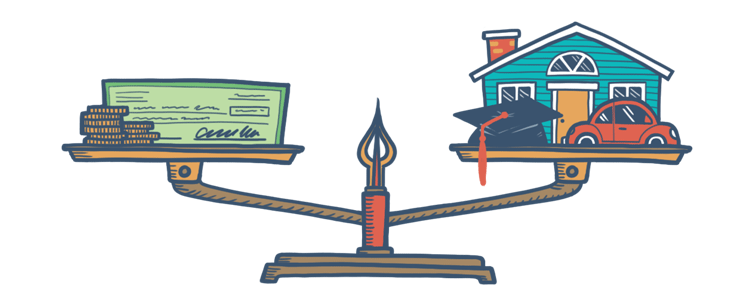Debt-to-Income Ratios

If FHA borrowers start to default on their homes, it defeats the main purpose of the FHA. That's why there are certain criteria in place to ensure that homebuyers are not signing up for home loans that they cannot reasonably afford and pay back. Since the FHA has no minimum income requirement, it relies on the borrowers' debt-to-income ratio to determine whether they have the means to make monthly payments.
What Are Debt Ratios?
Your debt-to-income ratio (also called a debt ratio) gives lenders a clear picture of how much you owe each month to how much you earn. The debt ratio is calculated by dividing the sum of your monthly debts and dividing it by your total assets.
For your monthly debt, the FHA take into account all the money you owe: credit card or lines of credit payments, car payments, student loan payments, taxes, insurance, alimony and child support, as well as the amount of your potential new house payment. Your pre-tax income, wages, tips, child support, social security, amounts to your total monthly assets. The number you arrive at after dividing your total debt by assets is your debt-to-income ratio.
The FHA's Debt Ratio Limits
According to HUD Handbook 4000.1, FHA borrowers can have a “maximum qualifying ratio” 43%. Add up the total mortgage payment for your potential new home (principal and interest, escrow deposits for taxes, hazard insurance, mortgage insurance premium, homeowners' dues, etc.) as well as your recurring monthly debt (car loans, personal loans, student loans, credit cards, etc.). Then divide that amount by your gross monthly income. That number should fall under 43% to qualify.
Many borrowers may have a high enough credit score to qualify for FHA loans and be able to make the down payment as well. But your debt-to-income ratio plays a big role in a lender determining whether you should be granted a loan. A good credit report is important, and it shows lenders that you have a history of making payments on time. But a debt ratio that's too high tells them that you have high monthly expenses compared to how much money you earn and that you might not be the best at budgeting.
The FHA makes some discretionary exceptions for borrowers with debt ratios higher than 43% based on certain “compensating factors.” Borrowers who have higher credit scores, verified cash reserves, or Energy Efficient homes might be granted a loan despite higher debt-to-income ratios.

FHA Loan Articles
August 14, 2023FHA loans typically require a minimum down payment of 3.5% of the purchase price of the home with the right credit score. This means that if you're buying a house for $240,000, you would need to make a down payment of at least $8,400.
August 10, 2023FHA loans have specific rules and requirements for borrowers who have filed for bankruptcy. The guidelines can change over time, so it's essential to consult with a qualified lender or FHA-approved counselor for the most up-to-date information.
August 3, 2023FHA loans are primarily designed to help individuals and families purchase homes for use as their primary residences. Rules for these loans generally discourage their use for investment properties or rentals. However, there are exceptions that come with strict rules.
July 29, 2023One crucial aspect of FHA loans that borrowers need to understand thoroughly is debt ratios. In this article, we look at how they can impact your ability to secure financing for your dream home. Debt ratios help lenders understand a borrower's creditworthiness and any risks associated with the loan.
July 21, 2023Investing in a multi-unit property can be an excellent way to build wealth through rental income and property appreciation. FHA multi-unit property loans make this opportunity more accessible to a broader range of individuals. You must occupy a unit as your primary residence within 60 days of closing the loan.
July 15, 2023To qualify for an FHA loan, you must meet certain employment requirements. In this article, we'll dig into the FHA loan employment requirements so that you can understand what's needed to get approved for this type of mortgage.








